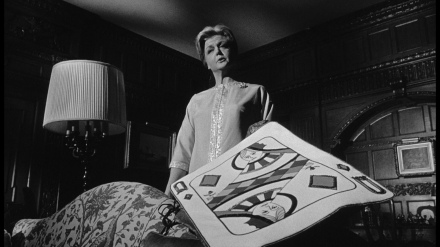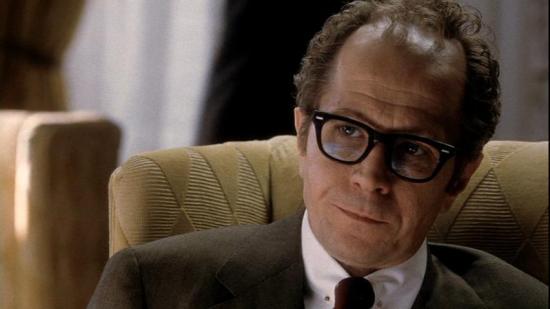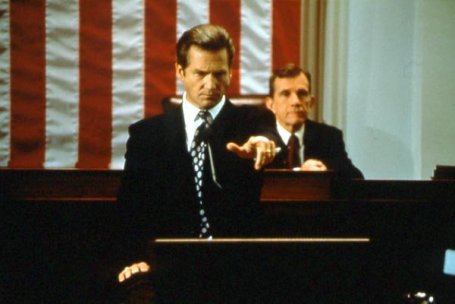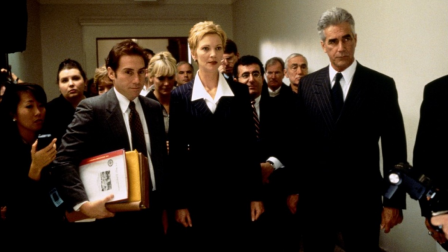You hear the word “character” pop up often when it comes to major elections in the US. It’s a weighty word, and if you choose to use it there’s an awful lot of unpacking that must occur, especially in a political context. You run into questions such as how is it defined? Can “character” mean something different to opposing parties? Does it mean something different to every individual? Does it signal something aside from its typical use when applied to the government? How, exactly, do we demonstrate “good character” vs. “bad character”– can you have either and exhibit behavior associated with the opposite? Finally, and vitally, does character matter, and should it matter at all to leaders and voters?
Note: This post is part of an ongoing project, the goal of which is to watch and contemplate every movie in which actor Gary Oldman has appeared (there are many, the man likes to work). Posts tend to contain reviews but are not excluded to that sort of framework– much like Gary’s career, I’m wildly unpredictable!
As with all MYWG entries, the following will probably contain spoilers!
- The Contender’s ranking on the Oldometer: 7/10
- Gary Oldman character quality: There’s so much to say about Runyon, the forceful Republican Senator that Gary portrays here. On the one hand, he is utterly the villain to the idealized Democratic Hero of the story, but on the other hand he is far, far from being one-dimensional. Runyon believes in his course of action and his definition of integrity as fervently as his opposition does, and I imagine if the story were flipped Runyon could be perceived as the hero who sticks to his guns. That said, in the finale of the film the screenwriting falls short and Runyon practically starts stroking his mustache and cackling, which is unfortunate, but he’s still highly memorable, and one of Gary’s most formidable roles.
- Does Gary die in this one? No.
The Contender, a drama released in 2000 (three years after Air Force One, if you’re counting), tackles some of these questions. In my opinion, it’s a good movie, in the tradition of truly great political films, a genre which had died out by the 90’s with the exception of Oliver Stone’s work, though his most popular films were primarily conspiracy stories (JFK, also co-starring Gary) and biopics (Nixon).
Let’s Back Up.

A bit of history for you: the earliest film I can think of with heavy political themes has to be Mr. Smith Goes To Washington, one of the jewels in Frank Capra’s crown, a nonpartisan film that is generally about the preservation of morality in the face of corruption, and a reminder of the ideals that served as the foundation of the United States. After that, a few films of this ilk followed suit, reflecting the (attempted, conceptualized, rose-colored whatever-you-want-to-say about it) unification of the country at the time (wartime, to be precise). But these movies weren’t really political; they merely used DC as a backdrop for traditional stories. Some of them might even be called propaganda (that’s a bit mordant, and I don’t agree with that, but it’s a viable view). But then came a different perspective.

Movies like the way, way ahead-of-its time A Face In The Crowd (see it if you haven’t, seriously) and All The Kings Men showed up on the marquee, and the real political genre was born. Admittedly, these were still vaguely nonpartisan– no one was naming names– but they were challenging pictures, and they let surface the concept that politicians had access to power, something that can be all-consuming, corruptive, and easily abused. These movies expressed the long cinematically dormant concept that blind trust in your politicians is a danger; just because we’re Americans doesn’t mean all of our leaders are good guys. Here you get a load of the birth of cynicism onscreen, and it’s a dark thing to behold.
Then came the 70’s, which, thanks to social tension running high (I presume), saw an explosion of political thrillers, conspiracy movies, and at the very least thrillers with themes rooted in divisive politics. Gone, finally, was the bipartisan stuff. But then, curiously, or possibly over the course of the US trying to pull itself together, this genre died for about a decade or two. The Contender, along with a handful of other films likely made in response to the Clinton administration and scandal, brought it back with a big ole bang.

Let’s Resume.
I would disagree with The Contender‘s official classification as a “thriller,” this is no Silence of the Lambs in DC, so if you haven’t seen the film don’t track it down with the expectation of feasting on something like The Manchurian Candidate. There’s not a good deal of physical danger involved here (at least, not for the politicians involved), and none of the leads are murdered. The film instead focuses on a different sort of assassination– one of character.
In a nutshell, The Contender tells the story of a distinctly Democratic POTUS, played by Jeff Bridges, not quite a lame duck but nearing the last stretch of his term, whose VP has died (one of the things I like about this movie is that it does not focus on this VP or begin the film with his death– he’s never seen). Jeff needs a replacement, but it’s a whole thing. There’s a potential choice in this one guy, a governor, who Jeff digs but ultimately rejects, despite much of Washington favoring him. No, Jeff says. His action on the VP issue is more than simply choosing someone fit to fill the role; it is a political move, and one he sees as a contribution he can make to the country. He wants this to be his “swan song,” and he wants to pick a woman for the job.
Enter Laine Hanson (Joan Allen, being awesome), a senator. She’s impressive, strong, and well-spoken; a good fit. The main thing that stands in the way of making this work is Republican Congressman Shelley Runyon (Gary), a powerful dude, who chairs the committee seeing to her confirmation hearing. Runyon is okay with the governor guy, but instantly rejects Laine. As with all things in politics, one questions if this is really because he deems her as unqualified as he claims. Could his resistance be a reflection of his desire to prevent progressive action on his watch? Does he detest Laine because she is a woman in a “man’s world” (or just because she’s a woman)? Or, finally, is this is really just a case of sour grapes? Once upon a time, we learn, Runyon himself had his eye on the Oval Office.

Jeff, who by the way comes off as a weird and winning mix of Obama and Dubya rather than Clinton (despite Obama’s relative obscurity at this time), asks Laine if she has anything in her past that she needs to put on the table before this thing kicks into high gear. She says no.
Almost immediately, Runyon digs up some dirt from her college days: a frat party where she, a sorority girl, may or may not have participated in openly granting sexual favors and possibly some kind of orgy. Though film exists of this event, her face is never fully seen, but the girl in the video looks like her and all the facts add up. Laine, enraged, refuses to comment on the incident and decides to neither confirm nor deny anything, on the basis that it shouldn’t matter what sex she did or did not have in college decades ago.
Alot– ALOT more goes on as The Contender unfolds, but two questions at the heart of the film lept out at me over this viewing like the pages of a pop-up book. First, as aforementioned, so far as politics are concerned, how do we define character, and does it matter? The other element I find more interesting: in a movie that fully rejects nonpartisan storytelling, how should we handle the championing of one party’s viewpoint and the vilification of another’s?

On Character
The Contender unabashedly reflects a major conversation of the late 90’s in its examination of the weight that the political sphere and the general public places on scandal. If someone in a high office of the government is involved in what the US at large rejects as immoral or generally unbecoming, should they be rejected? Even if we could all agree that participation in a college orgy or an extramarital affair is an example of bad behavior– which we can’t, by the way, because of religion, sex-positivity, feminism, a history of social repression, situational ambiguity, and the basic concept of free will– we cannot come to a consensus about whether or not a questionable, even recent personal history has any relevance when it comes to leadership. Did the fact that you had sex with Monica Lewinsky in the oval office affect how you handled foreign policy? What about the economy? Did the fact that you lied about a blow job and asked for a definition of the word “is” mean anything?

Liberals tend to say no; the logic that you had an orgy in college seems highly unlikely to have a hand in your political decisions. Conservatives lean towards yes; while these unseemly things may not directly lead to irresponsible choices made on behalf of your country, they are indicative of your core values, the very values that drive you to make all decisions.
I honestly see both sides of this argument, though I think each tends to pile it on thick. We’re all flawed people, if you shoplifted once upon a time I find it silly to suggest that such a mistake could prevent you from striving for decency when working with heavy issues, especially if you have your country’s welfare at heart. On the flip side, if you make cheating a regular practice it could very well be that you’re a selfish, greedy person who sees no problem with abusing power and steamrolling others to get your way, even when it comes to Big Stuff. Bottom line: a good person cares about others, they make the most solid choices they can, in hot water and otherwise, for the benefit of all. That’s the type of person you want in office.
That leads us to the curious case of our current election, in which the whole character argument seems to have been thrown out the window with vigor, but there’s too much and too little to say about that here.
The Contender makes a case for its long-suffering Laine Hanson by not actually discarding the concept of good character, but, in fact, championing it. Laine is the protagonist regardless of her innocence or guilt in context of the accusations being made against her. She is a stand-out person and politician because her true character, as the film values it, shines through while she is being attacked. In one scene she shares her whole-hearted beliefs with the committee, and declares her commitment to her country and her office (and potential office), and (because it’s a movie) we know she’s speaking from her heart.
Laine stands by her convictions while being grilled relentlessly, and never backs down on her decision to not discuss her college incident. She does this on principle; for herself, for anyone placed in the position of having to defend their irrelevant past, and, as she and many other characters note, for women, who are far more likely to be subjected to such scrutiny. Not only is she targeted for being a woman seeking office historically occupied by men only, she is also selected by the POTUS for being a woman– to President Bridges her talent and ability are second place to her sex. Furthermore, she is ripped apart by Runyon who despises her for the very reason the President selected her, in a way that women, in the public eye, struggle far more to come back from (let us think for a moment: we have forgiven Bill, ultimately, for his indiscretions. He’s on the cusp of being the First Gentleman. Where is Monica Lewinsky?).

In the face of all this, Laine holds it together, even when under unbearable pressure to bow out or detail and apologize for her “indiscretions.” She suffers on a major professional and personal level for defending her stance, but she doesn’t waver.
That’s a strong case, but the part of the film that made this angle work the most for me was when, after being raked over the coals by Runyon over abortion issues, Laine receives a visit from Runyon’s wife. Mrs. Runyon reveals that she abhors the way her husband has handled this whole shebang, and she gives Laine ammunition: Mrs. Runyon herself, though unbekownst to Congressman Runyon, once had an abortion. She gives Laine permission to bring this up publicly, but when Laine has the opportunity, even when Runyon reaches an all-time low in his attack, she makes the defining decision not to. That, The Contender says, is admirable character, and yes, it does matter.
[Weirdly, the movie almost shoots itself in the foot near its end when Laine breezily tells President Bridges that the girl in the video is not her, and that she was a good girl in college. Well. Okay.]

On Non/Partisanism
The problem with The Contender is it wants to have it both ways, which is amusing when you realize what a wholly liberal-hearted film it is. This movie is not shy about taking sides (helloooo blue states), which, given my penchant for the nonpartisan films of the past, I didn’t like at first, but after some thought I warmed to the idea. In our climate especially you can’t just make a movie set, even vaguely, in the world of politics without at least minimally acknowledging that politics exist.
Mr. Smith Goes to Washington and even Air Force One are unifying in a sense; we have no idea what party our heroes belong to, but they are good, and we like good guys so we’re gonna root for ’em, whether we favor a donkey or an elephant. But if you take this course with all screen stories it will eventually run aground because it’s ultimately unrealistic. Politics involve ideals and decision-making, but they also involve a two-party system. In this film, the Democrats are the good guys, which is fair enough, because in some cases they simply are. In fact, it’s almost refreshing– at least we know where this film is coming from.

But back to wanting your cake and eating it. The Contender actually starts out by presenting itself as being fairly balanced in its portrayal of its characters. Though its heroes belong to the Democratic party and the Republican party is here to antagonize, the movie takes care to flesh out its creations as much as it can. For example, though we side with Laine, we are thrown for a few loops when we find out that she and her husband, her campaign manager, had an ongoing affair while she ran in her first election. He was then married to another woman who happened to be Laine’s good friend; a deeply sympathetic lady who has been grievously wounded by her husband’s abandonment and her friend’s betrayal. Ouch.
We also learn that Laine, surprisingly, comes from Conservative stock (daughter of a prominent Rep. politician), and was once officially Republican herself. This is interesting, a would-be unifying detail for audiences and further possible excuse for Runyon’s disdain (traitor!), but it’s never really explored and is, in fact, too unbelievable given that Laine takes a moderate stance on nothing and is basically the postergirl for liberalism in the 90’s (she wants firearms stricken from every single American household? Woah, Nelly, not even Hillary is gonna go out on that limb). We also see different sides to the POTUS and his aides– Bridges may just not give a crap, his chief aide might be sexist, the once-favored for VP governor is crooked and goaded into his unforgivable behavior by none other than his ambitious wife (feminism yay?) etc.
This at times thoughtful, at other times flimsy means of unfolding the story is nowhere near as apparent (and intriguing) as it is with Shelly Runyon, in all of his complex villainy. Oldman gives one of his all-time best performances here, and Runyon, though balding and weasel-esque, is curiously commanding and articulate. It’s a strange charisma he has, and as you watch him you can understand why politics fit him like a glove. Though, thanks to the on-point dialog allotted to Runyon and Oldman’s super-sharp performance, we can see very clearly that Runyon’s issues with Laine emit from a number of different, questionable sources, his vocal objections to Laine’s appointment to VP is completely understandable: she’s unfit, she threatens his conservative values, and, mainly, President Bridges wants her onboard for no other reason than that she is female, which will reflect nicely on his administration (regardless of her abilities). This makes no sense to Runyon given that he finds another (Democratic) candidate infinitely more suited to the job (to his mind). That’s genuine party tension, and genuine concern, so of course this guy is going to do whatever he can to prevent Laine’s appointment from happening. If the parties were flipped, wouldn’t the opposition do the same thing? The film argues, for a split second, that Runyon is even sort of like Laine; they both stick to their beliefs and toe the party line.

Then, of course, Runyon sinks deeper into underhanded nastiness, and his attacks, whether or not they have ideals or facts behind them, are vicious and ironically without the character that he so vehemently insists a politician should have. At one point his wife tells him that she doesn’t understand who he’s become, that she used to be so proud of him. She mentions his rabid crusade against hate speech at one point. It doesn’t matter, Runyon is over it. He’s obsessed with ending Laine, and he’ll do even the illegal to destroy her. This too is believable. This is how corruption happens in politics.
So here then we have these two powerful characters, albeit hero and villain. I wish the film had stuck with its initial exploration into what is “good” and “bad” when it comes to standing by what you believe in, but I imagine that’s a hard thing to do when your story necessitates partisanism in a big way. Eventually it overthrows its attempt to make these characters multi-dimensional and opts instead for a strong finish, one that is, funnily enough, reminiscent of the schmaltzy, non-committal movies of the past.
Runyon practically turns into a fire-spewing dragon and destroys his career, President Bridges gives a WAY over-the-top speech about American Values and literally waves his finger at the committee members whilst hollering “shame on you!” In a moment that gave me a major case of eye-rolling, Runyon can’t handle it and slinks out of the room while President Bridges yells at him from his podium and the music soars.

Does Runyon deserve to be shamed, with his career ruined? Well, yeah, actually. Bad politician, bad choices. However, given the movie’s prior attempts to humanize everyone, good traits and bad, this feels wildly unbalanced. Let Runyon antagonize, but if we are meant to be challenged as viewers (as we are when we gain insight into Laine), must Runyon contort himself into a cartoon devil? Must he slink away with shame? Why not have him behave the way Laine has, sticking to those guns to the last, even if he’s wrong? Again: Runyon is a bad guy in this scenario, but it feels unjust to dehumanize him when his role in this story was to illustrate the motivation of the opposition, both as an individual and as a party representative. I find it dangerous and self-defeating to present him as a real person with conviction and conflict only to throw him away. You may think your political opposition human for a moment, people, but really they’re not, I hear this movie saying. They’re dead inside.
I do not belong to a political party, I find them entirely too reductive, manipulative, and, currently, divisive. I have long called myself an independent/moderate/centrist, I like to freely gather what I can from both parties, because I don’t think it’s possible for one group to represent the optimal way of doing things ALL the time. When in the presence of someone with very loud or extreme conservative or liberal views, I often find myself playing devil’s advocate and float ideas from whatever the opposition is in relation to the person I’m speaking with (though to be fair, 2016 has really changed how I look at things). I’ve wondered if I just do this to be contrary, but I think it at least comes from a sincere desire to bring as much balance as possible to the discussion, so when I watch The Contender I’m both very impressed and ruffled when it tries to present one party as wholly Good, though I am the first to admit that I’m not sure how I would feel if the story were flipped. I suppose it would depend on who I was talking to (is this a reflection on my own character? Probably).

But Wait, There’s More.
According to Hollywood Lore, this movie, produced by Gary (who selected it because he felt it championed a strong female lead) and his longtime manager Douglas Urbanski (a well-known conservative), almost sunk Gary’s career. This film was by far the best thing from this era (leading roles in big studio movies had ceased since 1995’s The Scarlet Letter, and he was getting much less choosy about parts than he used to be) but the minor scandal surrounding it didn’t seem to help matters. Reportedly, upon the film’s release Oldman was critical of the film, saying it ejected parts from the script and was cut in such a way that vilified Runyon and glorified the left, rather than remaining balanced. Well, yes. That’s clear. What’s unclear is how Gary managed to miss that when the film was being made, but I guess it’s possible. The director/writer of the film dismissed the “scandal” and offered the explanation that Oldman had gotten so much into character that he no longer saw Runyon as a villain, which is also possible, though when All-American Good Guy President Bridges cancels you, I don’t know how he could manage to view him as anything but a baddie, ultimately.
Oldman, who has never aligned himself with the Hollywood brand of liberalism (nor the conservatism of Urbanski, to be fair), got much flack for these comments. In fact, it’s been suggested that, even though he retracted his complaints, his disgruntled attitude cost him an Oscar nomination that year, even though his performance was praised as widely as Joan Allen’s (she was nominated for Best Actress). Instead, a Best Supporting Actor nomination was heaved towards Jeff Bridges, who is very good in this, but nowhere near as compelling. I imagine some Academy voters saw Oldman as biting the proverbial hand that fed him, while some viewed the entire thing as, well, political.

I can’t help but think that’s very interesting; there is no escape from politics, even when it comes to the arts, even when your choice is non-partisanism. And, much like the politics of US government, character, however we choose to define it, matters.


Not sure how I missed this one in August! So glad to read more of this, and to see this election tackled in a thoughtful way.
LikeLike
congrats on #10! glad to read your stuff.
LikeLike